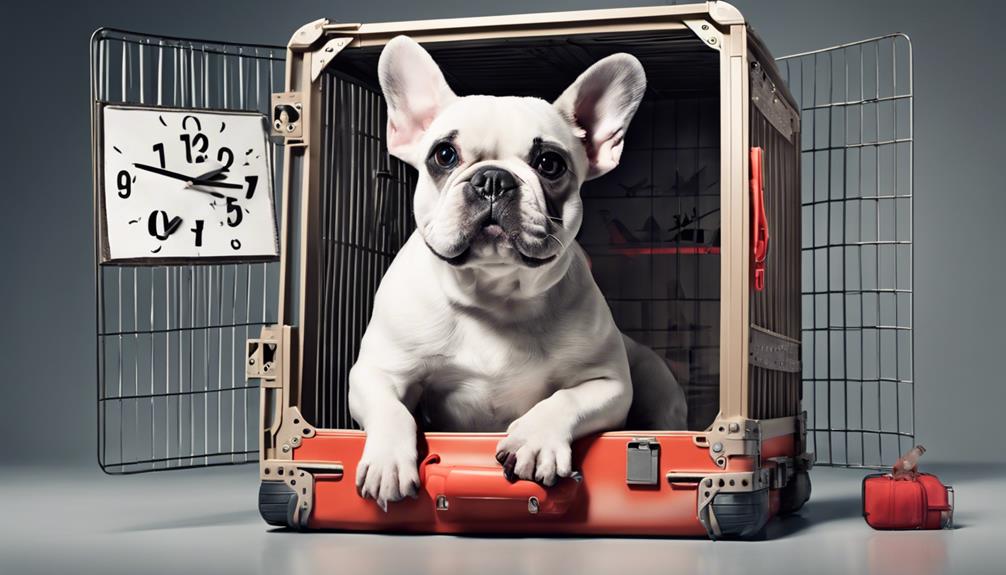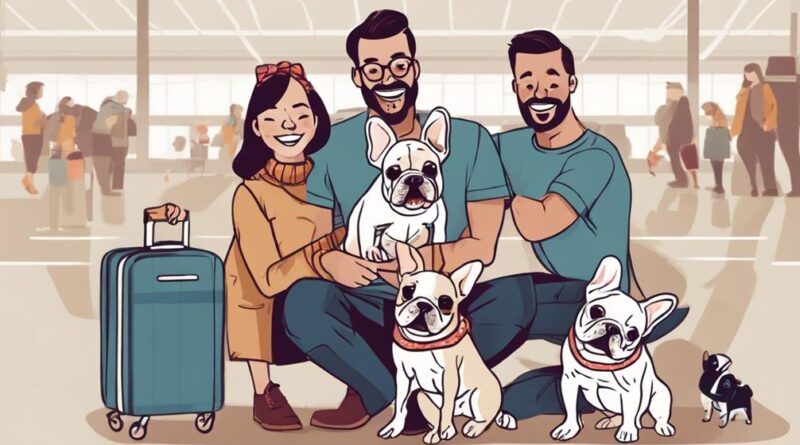What to Know About Adopting a French Bulldog Abroad?
If you're considering adopting a French Bulldog from abroad, did you know that the demand for this breed has increased by 236% over the past decade?
Understanding the process and nuances of adopting a Frenchie from a different country can be both rewarding and challenging. Before you make the big decision, it's crucial to be aware of various factors that come into play when bringing your new furry friend home.
Legal Requirements for International Adoption
When adopting a French Bulldog abroad, you must ensure you meet the legal requirements for international adoption. Understanding importation laws is crucial. Different countries have varying regulations regarding the importation of animals, including French Bulldogs. These laws are in place to protect both the animals and the local population from potential health risks and ensure the welfare of the animals being brought into the country.
Documentation requirements are another essential aspect to consider. You'll likely need to provide specific documents when bringing a French Bulldog from abroad. This documentation may include health certificates, proof of vaccinations, and import permits. Ensuring you have all the necessary paperwork in order is vital to prevent any issues or delays during the adoption process.
Before committing to adopting a French Bulldog from another country, thoroughly research the importation laws and documentation requirements of both the exporting and importing countries. Failure to comply with these legal requirements can result in complications, such as the denial of entry for your new furry friend. By being prepared and meeting all the necessary legal obligations, you can ensure a smooth and successful international adoption process for your French Bulldog.
Finding Reputable Breeders Overseas
To ensure the well-being and quality of your French Bulldog, it's essential to identify reputable breeders overseas. When looking for a breeder abroad, consider the following:
- Breeder Reputation: Research the breeder's reputation thoroughly. Look for reviews, testimonials, and feedback from previous customers to gauge the breeder's reliability and trustworthiness.
- Communication: Effective communication with the breeder is crucial. Make sure the breeder is responsive, transparent, and willing to provide you with all the necessary information about the French Bulldog you're interested in adopting.
- Health Guarantees: Reputable breeders will offer health guarantees for their puppies. Ensure that the breeder provides documentation of the puppy's health status and any necessary vaccinations or treatments.
- Overseas Puppy Transport: Understand the logistics of transporting a puppy from overseas. Inquire about the breeder's experience with international shipping, the conditions in which the puppy will travel, and any necessary paperwork or permits required for the journey.
Health Considerations and Vaccinations
Considering the health considerations and necessary vaccinations is crucial when adopting a French Bulldog abroad. Before bringing your new furry friend home, it's essential to schedule vet consultations to ensure they're in good health. French Bulldogs are known for some specific health issues like brachycephalic obstructive airway syndrome (BOAS), so having a professional assess their condition is vital.
During these vet consultations, make sure to discuss the dietary needs of your French Bulldog. These dogs can be prone to obesity, so it's important to establish a proper feeding routine and diet plan from the beginning. Your vet can provide guidance on the best food choices and feeding schedule to keep your French Bulldog healthy and happy.
In addition to vet consultations, vaccinations are a crucial aspect of your French Bulldog's health. Make sure to inquire about the necessary vaccinations for your pup based on the country's regulations and any specific health risks in the region you're adopting from. Keeping your French Bulldog up to date on vaccinations will help prevent diseases and ensure their well-being.
Travel Arrangements and Logistics
Making travel arrangements and coordinating logistics for bringing your French Bulldog abroad can be a complex yet rewarding process. When planning the journey for your furry companion, consider the following key points:
- Pet Passport Requirements: Ensure you have all the necessary documentation, including a pet passport, which outlines your dog's vaccination history and health records. Some countries may have specific requirements for entry, so be sure to check and fulfill these in advance.
- Flight Accommodations: Look into airlines that are pet-friendly and offer comfortable options for your French Bulldog during the flight. Check the guidelines for pet travel, including crate sizes and any restrictions or recommendations for a stress-free journey.
- Breed-Specific Import Restrictions: Research any breed-specific import restrictions in the destination country. Certain breeds, including French Bulldogs, may face stricter rules or regulations due to breed-specific legislation.
- Quarantine Exemptions: Investigate if there are any quarantine exemptions available for your French Bulldog. Some countries offer exemptions or reduced quarantine periods if all the necessary health requirements are met prior to arrival.
Cultural Differences in Pet Care
Understanding cultural differences in pet care practices can greatly impact how you care for your French Bulldog abroad. Grooming practices and feeding habits vary across different countries, and being aware of these differences can help you provide the best care for your furry friend.
When it comes to grooming practices, some cultures may have specific routines or preferences for maintaining a dog's hygiene and appearance. For example, in some countries, regular grooming sessions at professional pet salons are common, while in others, pet owners may prefer to handle grooming tasks at home. Before adopting a French Bulldog abroad, familiarize yourself with the local grooming norms to ensure your pet remains clean, healthy, and comfortable.
Feeding habits also play a crucial role in pet care, as different cultures have diverse dietary preferences for dogs. Some countries may have specific traditional foods or feeding schedules for dogs that differ from what you're accustomed to. It's essential to research and understand the local feeding habits to provide your French Bulldog with a balanced and appropriate diet while living abroad.
Language Barriers and Communication
Navigating language barriers while caring for your French Bulldog abroad requires effective communication strategies to ensure both you and your pet's needs are understood in a foreign environment. When dealing with linguistic challenges, consider the following:
- Training Techniques: Research universal training methods that rely more on body language and gestures rather than verbal commands. This can help bridge the communication gap caused by language differences.
- Nonverbal Cues: Learn to rely on nonverbal cues to understand your French Bulldog's needs and emotions. Dogs are highly perceptive to body language, so mastering nonverbal communication is key.
- Understanding Cues: Observe your dog's behavior closely to decipher their cues and signals. Understanding your French Bulldog's unique way of communicating will strengthen your bond and help you overcome language barriers.
- Professional Help: Seek out bilingual or English-speaking veterinarians and trainers in your new location. Having professionals who can bridge the language barrier will ensure that your pet receives proper care and training even in a foreign country.
Quarantine Regulations and Timelines

When bringing your French Bulldog abroad, ensure compliance with quarantine regulations and timelines to guarantee a smooth transition for your pet. The importing process may vary depending on the country you're moving to, so it's crucial to research the specific requirements and restrictions in place.
Some countries have strict quarantine regulations that mandate a period of isolation for pets upon entry. Make sure you're aware of these regulations well in advance to avoid any surprises or delays in your pet relocation process.
Additionally, consider the costs associated with pet relocation, including any quarantine fees that may apply. Budgeting for these expenses can help you plan effectively and ensure that your furry friend's move is as stress-free as possible. Some countries may also require specific vaccinations or health certificates for your French Bulldog, so schedule a visit to the vet to make sure your pet is up to date on all necessary medical requirements.
Adapting Your Frenchie to a New Environment
To help your Frenchie adjust to a new environment smoothly, gradually introduce them to the surroundings and establish a routine that provides comfort and stability.
When adapting your French Bulldog to a new environment, consider the following:
- Behavioral Training: Implement consistent training methods to help your Frenchie understand boundaries and expectations in the new setting. Positive reinforcement techniques can be particularly effective in encouraging good behavior.
- Socialization: Expose your Frenchie to different people, animals, and environments to promote social skills and reduce anxiety. This exposure helps your pup become more confident and well-adjusted in various situations.
- Diet: Ensure your Frenchie's diet remains consistent with what they were accustomed to before the move. Sudden changes in food can lead to digestive issues, so gradually transition to any new diet if necessary.
- Exercise Requirements: Maintain your Frenchie's exercise routine to help them expend energy and stay healthy. Regular walks, playtime, and mental stimulation are crucial for their physical and mental well-being.
Frequently Asked Questions
Can I Bring My French Bulldog From Abroad Back to My Home Country?
When bringing your French Bulldog from abroad back to your home country, it's crucial to research import regulations and quarantine requirements.
Make sure to plan travel arrangements and gather all necessary documentation, such as health certificates and vaccination records.
Failure to comply with these rules can lead to complications and delays.
Stay informed and prepared to ensure a smooth transition for your furry friend.
Are There Any Specific Cultural Practices or Customs in the Country I Am Adopting From That I Should Be Aware of When Caring for My French Bulldog?
When adopting from a different country, be mindful of cultural differences that might affect how you care for your French Bulldog. Training methods may vary, so take time to understand any unique practices.
Consider researching local customs regarding pet care to ensure you provide the best environment for your new furry friend. Stay open-minded and adaptable to create a harmonious relationship with your French Bulldog in your new cultural setting.
What Are the Costs Associated With Adopting a French Bulldog From Abroad, Including Transportation, Quarantine, and Other Fees?
Adopting a French Bulldog from abroad can come with various costs, including transportation, quarantine, and other fees. You may need to navigate import regulations and consider animal welfare.
Be prepared for potential language barriers and cultural differences when arranging the adoption process. Understanding these expenses and requirements upfront will help you plan and budget effectively for bringing your new furry friend home.
How Can I Ensure That My French Bulldog Receives Proper Veterinary Care in a Foreign Country?
To make sure your French Bulldog gets the right veterinary care in a foreign country, research travel restrictions and quarantine rules beforehand.
Be prepared for language barriers and overcome them by finding English-speaking vets or using translation apps.
Communicate clearly with local vets about your dog's health history and needs.
Stay proactive in seeking out reputable veterinary clinics and services to ensure your furry friend's well-being while abroad.
Are There Any Specific Training Techniques or Methods That Are Commonly Used in the Country I Am Adopting From That May Differ From What I Am Familiar With in My Home Country?
When adopting a French Bulldog abroad, you may encounter different training methods due to cultural differences. Language barriers could also affect communication with local trainers.
It's important to research breed regulations and socialization practices in the country you're adopting from. Be open-minded and willing to adapt to new techniques that may be commonly used there.
Proper training and socialization are key factors in helping your furry friend adjust to their new environment successfully.
Conclusion
Overall, adopting a French Bulldog abroad can be a rewarding experience, but it's important to be prepared for the legal requirements, health considerations, and cultural differences that may arise.
By finding a reputable breeder, ensuring your Frenchie is up to date on vaccinations, and making proper travel arrangements, you can help your new furry friend adjust to their new environment with ease.
Remember to also be patient and understanding as they acclimate to their new surroundings.
